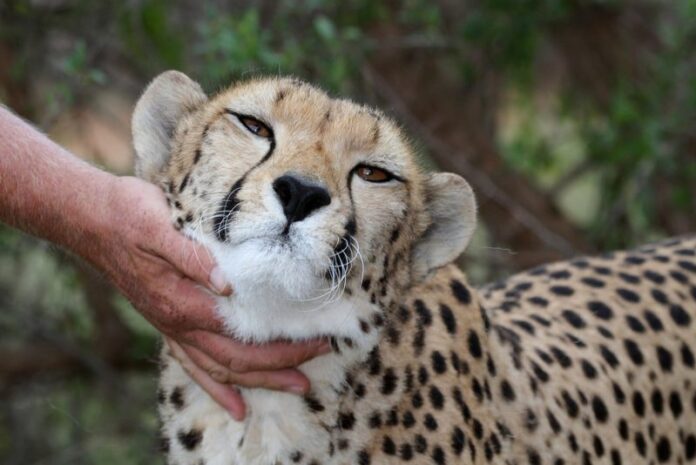Last Updated on October 15, 2023 by Fumipets
Do Cheetahs Make Good Pets? Everything You Need to Know!
The idea of having a cheetah as a pet might seem captivating, but it raises several ethical and practical concerns. Cheetahs are undeniably fascinating creatures, known for their incredible speed and grace.
However, considering them as pets comes with a multitude of challenges. In this summary, we explore the complexities of cheetah ownership and answer common questions regarding the suitability of cheetahs as pets.
Key Takeaways:
- Cheetahs are wild animals, and their needs and behaviors are fundamentally different from those of domesticated pets.
- Owning a cheetah may be illegal in many regions due to conservation laws and regulations.
- Caring for a cheetah requires specialized knowledge, resources, and facilities, making them unsuitable as pets for the average person.
- Ethical considerations revolve around wildlife conservation, animal welfare, and the impact on wild cheetah populations.
Do Cheetahs Make Good Pets?
In addition to being the world’s fastest land animal, cheetahs are also elegant, graceful, and agile cats. They may be less hazardous to people than lions or tigers, too. Do they still make nice pets, though? In a nutshell, we do not recommend keeping cheetahs as pets since they do not make excellent pets at all.
Why? Cheetahs are largely wild creatures, despite the fact that they are often regarded as being more tameable than other big cats. This implies that despite your best efforts, they have extremely particular requirements that are difficult to meet while being kept captive. The moral implications of owning such a feline as a pet should also be taken into account. So, do cheetahs make good pets? Let’s find out!
Who Keeps Pet Cheetahs?
The newest trend in the Gulf nations is not to own a fancy automobile or a dream home. The alternative is to keep a cat as a pet. Not a cat; more of a cheetah, tiger, or lion. These creatures have proliferated recently in nations like Saudi Arabia, Qatar, Kuwait, the United Arab Emirates, and others, and their owners no longer hesitate to display their trophies on social media. Cheetahs, one of the most sought-after felines, are a good example of this.
In response to criticism from animal protection organizations, a number of nations have voted to outlaw the ownership, sale, and breeding of exotic animals in light of this rising trend and the dangers it poses. The legislation was approved in the United Arab Emirates in January 2017 and mentions penalties of up to $136,000 and jail terms of up to 6 months. The keeping of exotic animals is illegal in Kuwait as well.
Despite this, there are still few regulations, long delayed prosecutions, and persistent fashion among the wealthiest.

Why Keeping a Cheetah As a Pet Is a Bad Idea
1. The population of wild cheetahs is in continuous decline.
Due to the fact that there are only around 6,700 adult individuals left in the wild, the cheetah is included on the Red List of the International Union for the Conservation of Nature (IUCN) as vulnerable. Poaching is not the only hazard to the animal; it also faces habitat erosion and conflicts with people since the cheetah is still often seen as an annoyance. The cheetah, which was formerly common across Africa and West Asia, has vanished from numerous nations, including India, Morocco, and Nigeria.
Iran is the only place in Asia where cheetahs are still alive. The majority of people live in Namibia, Botswana, and Zimbabwe in Africa. Inbreeding has become a more serious concern to the cheetah due to falling numbers and habitat destruction. As a result, throughout the years, reproduction amongst relatives has further degraded the genetic inheritance of the species, making it more susceptible.
2. Cheetahs have very special dietary needs.
Cheetahs are often fed and cared for improperly, like the bulk of wild animals kept as pets.
In general, those looking to own cheetahs know very little about their nutritional requirements. Such a kitty was not created to continuously consume raw chicken! In addition, these poor diets result in serious health issues such as spinal cord degeneration and myelopathy, which paralyzes the rear limbs.
3. Cheetahs require specific holding facilities.
To maintain cheetah health, large holding facilities are required. These cats are physiologically designed to run, not to be led about and kept in cramped places where they get very little exercise.
4. Many baby cheetahs die before they even reach their destination.
Around 300 newborn cheetahs are smuggled into the Arabian Peninsula each year, according to estimates from the non-profit organization Cheetah Conservation Fund (CCF), to be sold as pets. In contrast to the tens of thousands of elephants that are killed each year, these figures are genuinely shocking for the cheetah population.
The cheetah traffic does indeed leave a lot of dead bodies in its wake. When young cheetahs are taken when they are just two weeks old, they may not survive the journey or may later have chronic illnesses as a result of not receiving breast milk. As they won’t be able to survive in the wild or get the food they need, there is a danger as soon as they are removed from it. The health of cheetahs may rapidly decline, and they can pass away in a matter of hours.
Even if they make it through the difficult circumstances of travel and the lack of food and water to the market, their life expectancy will be influenced by their owner. The typical lifespan of cheetahs is one year, although many of them pass away after just a few months. Many get infections from household cats and have bone abnormalities, neurological degenerations, or die away as a result.

5. Cheetahs are sold at exorbitant prices.
Profitable sales are made when cheetahs are kept as pets. Customers are prepared to spend up to $15,000 to own one of these expensive pets. Yet, as was previously indicated, roughly 80% of young cheetahs perish in the procedure. In fact, it’s thought that five out of every six newborn cheetahs die on the journey. Given this information, who would be eager to purchase a cheetah and support the unlawful trade that results in the deaths of dozens, if not hundreds, of helpless creatures each year?
6. Cheetahs in captivity are more affected by disease than their wild counterparts.
Mistakingly thinking that a cheetah housed in captivity would be “protected” from the perils experienced in its natural environment, some individuals may want to adopt cheetahs in order to support breed conservation efforts. Sadly, cheetahs reared in captivity are more susceptible to a variety of diseases. In fact, even when housed in wildlife conservation facilities, where their living circumstances are often ideal and where they are cared for by biologists and veterinarians, these felines are more prone to infections than other big carnivores.
The following illnesses often affect cheetahs kept in captivity:
Chronic stress
Gastritis
Feline herpesvirus
Feline Enteric Coronavirus
Infectious Skin and Oral Mucosal Conditions
Fungal disease
Pancreatitis
Amyloidosis
Liver disease
Myelopathy
Renal disease
The majority of studies contend that environmental variables, like stress brought on by captivity, are just as important as hereditary factors in the development of illnesses in captive cheetahs, if not more so.
The last word? Compared to their other feline relatives, cheetahs are weaker in the health department. As a result, keeping them in captivity typically hinders rather than helps in their survival.
Conclusion
Cheetah numbers worldwide have decreased over the last 100 years from 100,000 to fewer than 6,700. Just a few hundred people are said to be left in several regions of East Africa, such Ethiopia or Northern Kenya. Regrettably, the illicit pet cheetah trade, which has now expanded into large-scale trafficking, has the greatest impact in these regions. Hence, keeping these gorgeous cats in a backyard endangers the species even more. Volunteering at a wildlife center, however, could be a terrific opportunity to meet and assist these amazing animals if you wish to take part in cheetah conservation efforts.
Frequently Asked Questions:
Can I legally own a cheetah as a pet?
Laws regarding cheetah ownership vary by country and even within regions. However, owning a cheetah is often restricted or illegal due to conservation efforts and concerns about public safety.
What are the challenges of keeping a cheetah as a pet?
Cheetahs have specialized dietary, environmental, and exercise needs that are challenging to meet in a home setting. They can also pose a safety risk to humans.
Are there any cases of cheetahs being successfully kept as pets?
While there have been instances of private individuals owning cheetahs, these cases are exceptions and may involve significant resources and expertise.
Can a cheetah be domesticated, like a dog or a cat?
Cheetahs are wild animals, and domestication, as seen in dogs and cats, is a lengthy, generational process. Cheetahs still retain their natural behaviors even when raised by humans.
How can I support cheetah conservation without keeping one as a pet?
Supporting reputable conservation organizations, donating to cheetah conservation efforts, and raising awareness about the challenges cheetahs face in the wild are impactful ways to help protect this magnificent species.


















